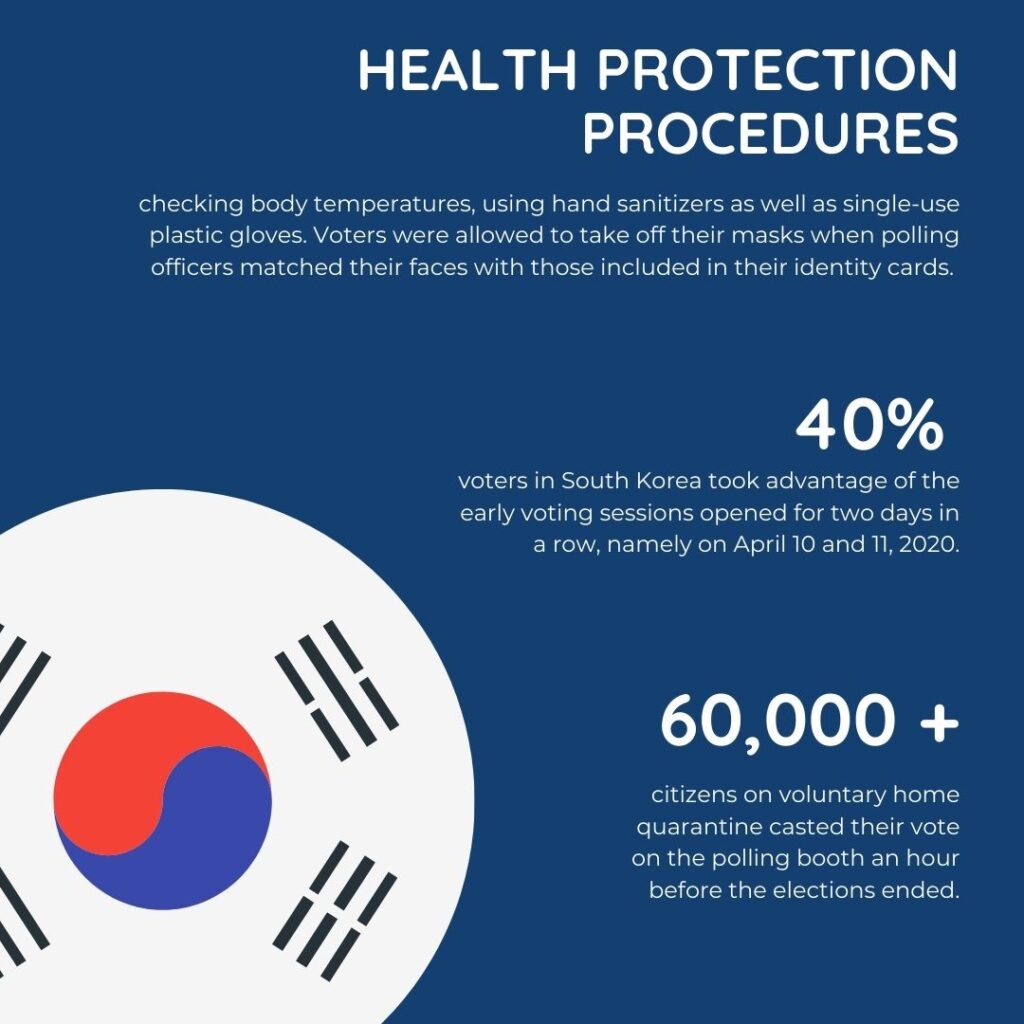Safeguarding voters’ rights while preventing the transmission of the coronavirus become two key concerns among countries which have decided to go on with their elections amid the COVID-19 pandemic.
The polling station in Pangyo, Seongnam city in South Korea looked different in April 2020 compared to the way it had always familiarly appeared in the previous general elections. For instance, voters no longer crowded around the voting booths.
One of the voters Catherine Kim shared her experience taking part in that celebration of democracy amid the threat of the coronavirus in an article published by vox.com titled I voted in South Korea’s elections. This is what democracy can look like in a pandemic, published on April 17, 2020. Kim told the journalist writing the piece that all citizens were required to go through various health protection procedures, including maintaining less than one meter distance between them, wearing face masks, as well as having their body temperatures checked.
“Those with body temperatures higher than 37.5 degrees Celcius were subsequently escorted to a separate polling station, before swiftly being headed off for a virus test,” Kim said.
South Korea has been an example of how a country could successfully conduct its legislative elections, even when about 900 new cases of coronavirus per day was still being reported there. In order not to turn the polling stations into new clusters of infection, voters who had passed the body temperature checking procedure would be provided with a hand sanitizer as well as a plastic glove which they would use only while casting their votes inside the voting booths. In order to verify voter identity, polling officers would ask voters to take off their masks for a little while so these officers could match the voters’ faces with the pictures seen in their ID cards.
According to Kim, each voter took only 10 minutes to complete all those health and hygiene protocol procedures before eventually casting their vote and go home.


Furthermore, South Korea’s elections organizer also applied an early voting system on April 10 and April 11, 2020, open from 8 to 10 a.m. only, which sought to decrease the density of voters crowding the polling booths on the first voting day. At least about 11 million voters in South Korea, accounting for 40 percent of the country’s total voters, decided to benefit from the two-day early voting system.
Out of the 3,508 polling stations that were opened during the elections, eight among them were specifically designated for COVID-19 positive patients. Those polling booths were supervised by officers wearing complete personal protection equipment, including Hazmat clothes.
Jo Jin-ju, the deputy director of the South Korea-based association of the worldwide elections body’s training division said that the voting organization on April 15, 2020 was being held according to the technical guidelines on COVID-19 transmission prevention during the elections issued by the country’s national elections commission. Various other Asian countries planning to conduct their elections during the pandemic, like Indonesia, Singapore and Sri Lanka have later also adopted the guideline.
Jin-ju said that the elections organizers in South Korea did not want to let the pandemic caused its citizens to lose their voting rights.
“South Korea prepared its elections guided by two fundamental principles: guaranteeing a safe voting environment, guaranteeing the rights of voters who had been diagnosed with COVID-19, as well as guaranteeing the rights of voters who underwent voluntary home quarantine,” Jin-ju said during an online discussion called Implementing Elections During the Pandemic organized on June 12, 2020.
The polling officers allowed 60,000 South Koreans on home quarantine a chance to cast their vote, giving each of them an hour to do it before the voting hours had officially ended.
“Medical patients and workers, meanwhile, were given different voting time slots,” Jin-ju said.
Singapore, meanwhile, has a different pandemic elections story to tell. The country had no choice but to annull the voting rights of COVID-19-positive patients, as well as the voting rights of citizens who had received the quarantine order letter. The Singaporean elections department prohibited those people from casting their vote during the general elections on July 10, 2020.
“We made that decision to minimize [the positive patients’] contacts with other citizens and reducing community-level transmission risks,” said a press release made available by the Singaporean Prime Minister’s office, which oversees the country’s elections commission, on Wednesday, July 1, 2020.
Singapore’s high infection rate gave the government no choice but to facilitate only voters who had received the stay at home notice letter. The letter contains a 14-day voluntary home quarantine order for tourists who had already obtained permit to enter Singapore. The government has taken the above measure to minimize imported COVID-19 cases. The local elections commission turned two hotels – the Marina Bay Sands and J.W. Marriott Singapore South Beach as makeshift polling booths for voters who had gotten the stay home notice letter.
Based on the special regulation on health and safety protection during Singapore’s 2020 election, polling officers would also visit the homes of voters who did not feel well or whose body temperature exceeded 37.5 degree Celcius. The commission allocated two additional hours to serve those voters at home. Those who did not feel well but had normal body temperature could come to the polling booth using the extra two-hour time slot.


To prevent overcrowding during the polling dates, Singapore divided its voters into still several more time slots. Voters older than 65 as well as those with disability were given the 8 to 10 a.m. time slot, as announced in the invitation letter they had received a day before the election.
Singaporean human rights civil organization Maruah founder Braema Mathi said that the Singaporean government’s measures to protect its citizens’ health were far from bad. Yet, one of these measures, namely physical distancing, is yet to bring down the infection rates in the country, according to Mathi.
“There is still an impending risk of a second wave outbreak. People are hoping that the country could postpone the elections to a much safer time,” Mathi said during a webinar themed What’s going on in Singapore, organized on Sunday, June 5, 2020.
Within 14 days since Singapore organized the election, Singapore’s average daily infection rate has soared to 300 new cases every day.
Fortunately, Mathi’s anxiety that Singapore’s 2020 election would receive a low turnout due to the pandemic did not come true. On July 15, 2020, the Singaporean elections commission announced a 95.81 percent voter turnout during the election, up two percent compared to the last Singaporean elections in 2015.
***
Meanwhile, the Sri Lankan general elections commission Mahinda Deshapriya set his sights on 75 percent voter turnout on the Aug. 5, 2020 elections. The turnout rate was much lower compared to the avarage turnout percentage of the previous elections, which stood around 80 to 82 percent.
“We want to make the public sure that the polling booths are safer than any other types of public space. So, please come to the polling booths and cast your vote,” he said during a discussion themed the 2020 Sri Lankan Parliamentary Election: a Situation Update on June 27, 2020.
To ensure that the polling booths were safe enough for voters, Deshapriya said that the commission made it compulsory for all officers and voters to put their face masks on, clean their hands using hand sanitizer before and after interacting and exchanging documents with each other, as well as keeping a safe one-meter distance before the voting began. The commission also installed protective barriers between the booths to prevent direct face-to-face interactions between voters and polling officers.
The commission also appointed one medical worker in each polling station. Deshapriya calculated that they needed up to 40,000 additional medical and sanitation workers across 14,000 polling stations. The sanitation workers would also clean the polling booths regularly.
He said that recruiting additional polling officers had given him no choice but to propose for an additional Rp 518 billion (US$37 million) fund from the state budget.
“Money isn’t the problem; the problem lies in how to save democracy [amid the pandemic],” he asserted.
Once, Deshapriya proposed that Sri Lanka conducted an early voting slot for those undergoing home quarantine, scheduled on July 31, 2020. Unfortunately, the Sri Lankan elections regulation could not accommodate the proposal; this has caused the commission to extend the voting period instead, to prevent overcrowding.
“Instead of installing more voting booths, we extend the voting period,” he said.
***
Then, what about Indonesia? To prevent overcrowding in the upcoming simultaneous regional elections on Dec. 9, 2020, the country is planning to add 50,000 extra polling stations. The amount is based on the assumption that one polling station could only accommodate 500 people, down from the previous number of 800.
The Indonesian General Elections Commission Chairman Arief Budiman explained that the regional elections budget had inflated to Rp 4.7 trillion (US$318.4 million) due to the enormity of conducting the elections during the pandemic. Besides using the money to install more polling booths, the jumbo-sized budget would also be used to procure personal protection equipment across 304,000 polling stations throughout Indonesia.
After the first phase of the budget allocation has been disbursed in late June 2020, Arief said he hoped that the second phase of the budget could be disbursed in August 2020. October 2020, meanwhile, is when the third disbursement phase is expected to happen.
“Also, budget in the first disbursement phase has not been fully made available yet, I hope they can include that in the second disbursement phase. If the remaining budget hasn’t been available on the voting day, I don’t want to take risks [in organizing the elections],” Arief said on July 10, 2020.
Data that the Indonesian Health Ministry made available on Aug. 17, 2020 revealed that Indonesia recorded 141,370 cases of coronavirus with 6,207 deaths. Arief said the commission guaranteed that all citizens would be able to exercise their voting rights in December 2020. He added that COVID-19-positive voters also did not need to worry because the polling officers would visit hospitals to get these patients’ to vote.
He said that polling officers in each region would work closely together with hospitals and members of the COVID-19 task force to collect data on hospital-bound voters as well as voters currently on voluntary home quarantine. Data collection should be finished at least a day before voting begins.
“Voting officers can visit hospital- or home-bound voters only upon obtaining the consent of these voters,” he explained.


Asian Democratic Network Program Manager Suh Soon-yoon advised countries that were about to conduct their general elections amid the pandemic modeled South Korea’s approach.
Besides getting the health protocols in place, South Korea also provided technology wares and internet connection during the campaign period. The East Asian country did not even hesitate to provide a much bigger elections budget to employ more officers in the field.
“South Korea’s budget had made it possible for it to employ more voting officers while providing personal protection equipment to all,” Soon-yoon said upon being contacted on June 26, 2020.
He added the fact that no new infections were recorded after the elections had just ended made South Korea confident to declare its pandemic-time elections a success. Elections organizers, the government and health organizations needed to work together to formulate concrete strategies in conducting the elections safely amid the pandemic, by taking into account each country’s own unique context, he said.
“The success of South Korea’s elections is especially thanks to its healthcare institutions which have tackled the pandemic very well. These healthcare institutions wouldn’t have approved of the elections to go on if they couldn’t deal with the pandemic,” he concluded.







